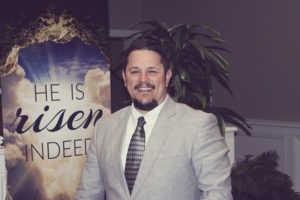The Tennessee Baptist Convention on Wednesday passed a resolution strongly denouncing Critical Race Theory and intersectionality as “inconsistent with a biblical worldview and theology.”
The statement puts Tennessee Baptists on record against a resolution passed by the Southern Baptist Convention in June endorsing theories from social sciences as “analytical tools subordinate to Scripture” to better understand social dynamics and human experience.

Shawn Allred
The Tennessee resolution, drafted by a committee at the recommendation of messenger Shawn Allred, pastor of First Baptist Church in Kenton, Tennessee, affirms the Bible “as the first and only framework for evaluating the world around us including academia and social sciences.”
It describes Southern Baptists gathered Nov. 19-20 in Knoxville, Tennessee, as “deeply troubled” by efforts to inject “unbiblical worldviews” into a theological context.
The SBC resolution, adopted in the closing moments of the June 11-12 Southern Baptist annual meeting in Birmingham, Alabama, defined Critical Race Theory as “a set of analytical tools that explain how race has and continues to function in society.” It is closely related to “intersectionality,” the “study of how different personal characteristics overlap and inform one’s experience.”
While insufficient by themselves to address the root cause of social ills they identify, the resolution said, such “analytical tools can aid in evaluating a variety of human experiences” and can be “employed to address social dynamics.”
While the resolution received a majority vote among messengers still around for the closing session, it was the only part of the SBC Resolutions Committee report met by significant opposition.
Tom Ascol, a Florida pastor and president of Founders Ministries, argued unsuccessfully that Critical Race Theory and intersectionality are “rooted in ideologies that are incompatible with Christianity.”
“The postmodern, deconstructionist worldview has given rise to godless ideologies like radical feminism, Critical Race Theory and intersectionality,” Ascol wrote later.
“These ideologies are being smuggled into conservative Christian churches and entities often by well-meaning but misguided teachers,” Ascol said. “If they are not identified and repudiated, they will have disastrous consequences for the spread of the gospel and the faith of millions of people. These ideologies are not merely opposed but are actually antithetical to the gospel of Jesus Christ.”
Predating the 2019 SBC annual meeting, evangelical leader John MacArthur and a dozen other Christian leaders denounced Critical Race Theory and intersectionality in a much-discussed Statement on Social Justice & the Gospel last fall.
Now with more than 12,000 signatures, MacArthur’s statement denied “that the postmodern ideologies derived from intersectionality, radical feminism and Critical Race Theory are consistent with biblical teaching.” It rejected “any teaching that encourages racial groups to view themselves as privileged oppressors or entitled victims of oppression.”
Since the SBC annual meeting, some have viewed the Southern Baptist resolution on Critical Race Theory and intersectionality as evidence that the denomination is moving away from core values of the Conservative Resurgence and toward the social gospel orientation typically associated with the Religious Left.
Endorsing the Tennessee Baptist Convention resolutions committee rewrite of his original submission, Allred named Scripture “the supreme standard for which all human conduct, theories and ideologies should be tried.”
“This resolution champions Scripture as our supreme authority and also stands against the ungodly and worldly theories of Critical Race Theory and intersectionality,” he said.
“While Critical Race Theory and intersectionality seek to divide us, the word of God unites us all in the identity of Christ,” the pastor said.
